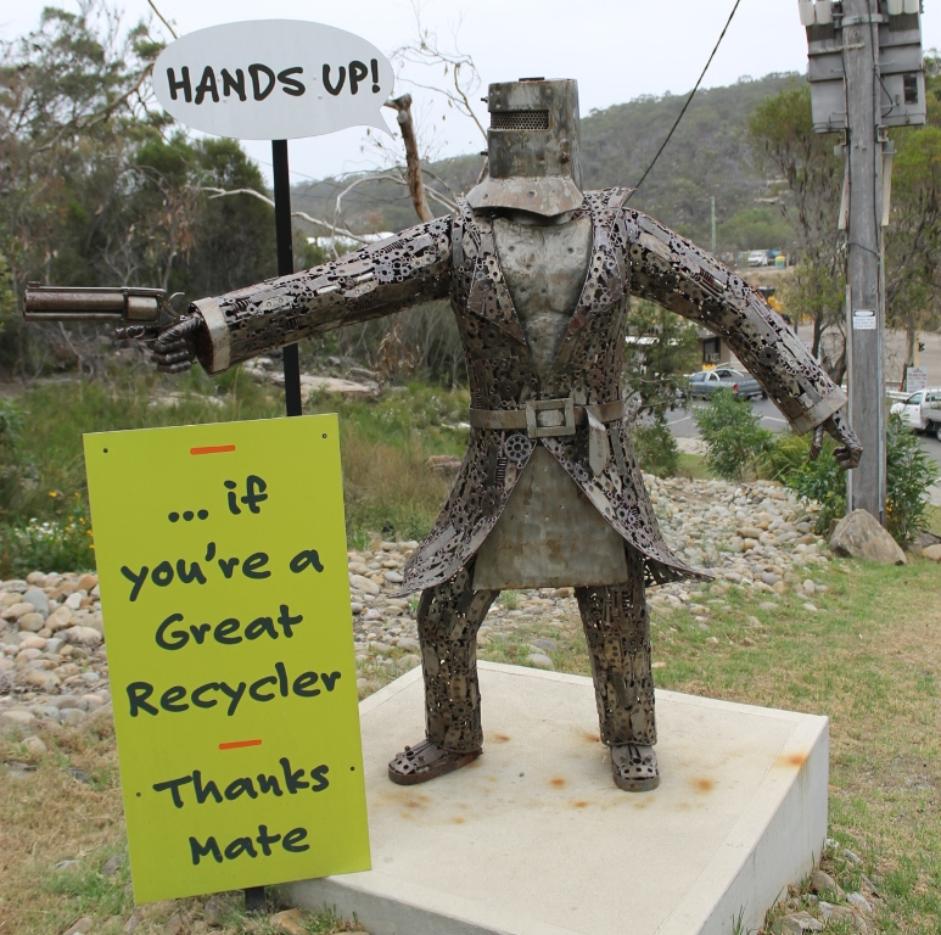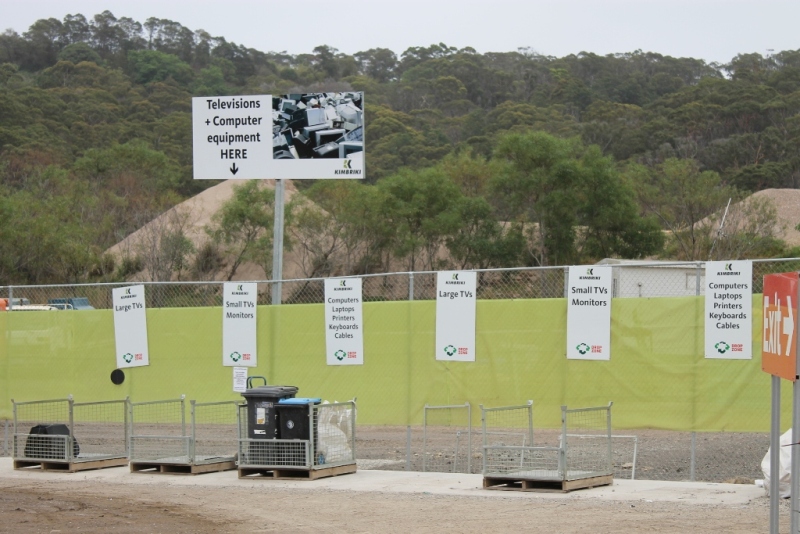April 21 - 27, 2013: Issue 107
Kimbriki Resource Recovery Centre and Amendments to National Television and Computer Recycling Scheme released for public comment

Sculpture at entrance to Kimbriki Resource Recovery Centre - made from discarded metals. Photo by A J Guesdon.
As the weather cools and the gold of the first half of Autumn acquires a metallic tinge, these resinous airs remind us the earth’s cycles have taught us to recycle and to what points we have evolved this; keep it limitless and whole, circular, like the earth’s cycles, seems to be the motto.
A recent trip to Kimbriki to their Re-use Shop with a builder looking for a door for a client in measurements not made anymore was an eye opener into all else going on at the Kimbriki Resource Recovery Centre.
With almost 70% of the 220,000 tonnes of waste received each year recycled as Construction and Demolition recycling, Metal recycling, Vegetation and wood waste recycling, Household recycling as well as Televisions and computer equipment now being recycled, KEE (Kimbriki Environmental Enterprises) is literally proving how effective a waste not want not policy of old can create a new world.
The release this week from the Federal government of proposed Amendments to National Television and Computer Recycling Scheme and an opportunity for the public to comment and International Composting Awareness Week Australia (Monday 6 – Saturday 11 May 2013) beginning in a few weeks, for which Pittwater Council is offering through Eco House at Kimbriki a Celebrate International Compost Week Workshop on Ecological Living and Gardening on the 30th of April, it is timely to look at all else occurring at Kimbriki.
An annotated list of items recycled and by whom from the Kimbriki Resource Recovery website: www.kimbriki.com.au/
The Peninsula Senior Citizens Toy Repair Group collects and repairs toys which are then donated to children’s charities.
Used clothing deposited into The Smith Family bins is sorted and re-used through The Smith Family charity shops or sold as textiles for industrial rag supply.
Used motor oil can be deposited by customers into the storage tank onsite and is collected by Nationwide Oil. At Wetherill Park the oil is recovered by a unique chemical process that removes water and heavy metals.
Tyres are removed from the site by Roadrubber Tyres. They are taken to Enviroguard’s shredding processing facility – Tyrecycle at Erskine Park. Rims are removed prior to disposal. Up to 5 tyres can be disposed of per customer visit (this limit is set by the NSW Department of Environment, Climate Change and Water). Charges Apply.
Kimbriki can supply used rimless tyres, however, an application must be submitted and approved prior to arrival on site for collection. Contact us for more information. for more information. Tyres will not be supplied for use on vehicles.
Vehicle batteries are collected by Hydromet. This company processes used lead acid batteries (ULAB’S) at its Unanderra NSW processing facility. These ULAB’s are fed into a battery breaker which separates the lead metal, lead paste, polypropylene and weak acid into discrete streams ready for treatment prior to recycling in secondary lead smelters, with lead chemical manufacturers, and plastics recyclers.
Acid is recycled to produce chemicals within the Hydromet group. www.hydromet.com.au
Cardboard and paper – glass bottles, plastic bottles (PET and HDPE), aluminium cans.
Computers and televisions are accepted at Kimbriki for recycling. Any householder or small business operator, in a car, ute or trailer, may deliver up to 15 items free to Kimbriki.
More than 98% of PC components can be efficiently recycled by MRI. See www.mri.com.au for more information.

The gem in all this is the Eco House and Garden. Launched on June 1st 2011 by Dick Smith. The Kimbriki Eco House and Garden is a unique education centre dedicated to exploring how to live in a more sustainable way - a place for you to experience, learn and be inspired. The Eco House and Garden offers workshops, a corporate training course and encourages school group visits. Upcoming events, besides the International Compost week Workshop include a Composting and Worm Farms on Thursday May 9 and 12 while on June 13th and 16th a Beginner’s Organic Vegie Garden Workshop is on offer. All these Workshops are free and you can book online at their own Eco House website .
The Eco Garden is open Monday – Sunday, 7am - 4.30pm (closed Christmas Day and Good Friday). Senior Eco Gardener and resident expert, Peter Rutherford, is on hand to offer advice and answer your questions during Kimbriki Eco House and Garden’s drop-in time on most Thursdays 1-4pm. Website: http://www.ecohouseandgarden.com.au/content/about-us
When we spoke to those on duty yesterday we were told Peter has lately made planter boxes from Pool filters and these are very attractive and would cost at least a couple of hundred dollars if purchased.
Pittwater Council - Join our Workshop on Ecological Living and Gardening - 30th Apr 2013, 10am - 12:30pm
 Celebrate International Compost Week by Joining our Workshop on Ecological Living and Gardening. Small, positive changes made by everyday people can have a significant impact on our environment. This course will open the door to living a healthier, more sustainable lifestyle for you and future generations. This workshop incorporates a full tour of the Eco House and Garden and covers the following topics:
Celebrate International Compost Week by Joining our Workshop on Ecological Living and Gardening. Small, positive changes made by everyday people can have a significant impact on our environment. This course will open the door to living a healthier, more sustainable lifestyle for you and future generations. This workshop incorporates a full tour of the Eco House and Garden and covers the following topics:
An overview of all Kimbriki’s Eco House and Garden workshops; What is Ecology?; How can I make a difference?; An introduction to the basics of organic gardening; An introduction to ‘biogenics’ – the healing power of plants; How your garden can keep you and your family healthy; The tasting of edible flowers; The real difference between organic and non-organic food
Cost: Free. Where: Kimbriki Eco House & Garden; Eco House and Garden are within Kimbriki Resource Recovery Centre, Kimbriki Rd, Ingleside. Please enter by the ‘Cars’ entry by stopping to speak to our staff. Proceed then 100m to the car park left of the Eco House. Bookings are essential due to limited places, please call the Education Team on 9970 1194.
International Composting Awareness Week Australia with a theme of Better Soil, Better Life, Better Future runs from Monday 6 – Saturday 11 May 2013.
International Composting Awareness Week Australia (ICAW), is a week of activities, events and publicity to improve awareness about the importance of this valuable organic resource and to promote compost use, knowledge and products. We can compost to help scrap carbon pollution by avoiding landfilling organic materials and helping to build healthier soils.
The other relative aspect of what is going on at Kimbriki announced this week:
Amendments to National Television and Computer Recycling Scheme released for public comment
(Media release, 17 April 2013)
The Australian Government today released a discussion paper which proposes amendments to the regulations governing the administration of the National Television and Computer Recycling Scheme. Parliamentary Secretary for Sustainability and Urban Water, The Hon Amanda Rishworth MP said the public consultation period offers an opportunity for interested parties to help build on the early success of the scheme.
"The discussion paper is based on the experiences gained during the scheme's first year of operation and on feedback from the television and computer industry organisations running the scheme," Ms Rishworth said. "Given its ground-breaking nature, we commenced the scheme anticipating that operational experiences would identify further opportunities to fine-tune and enhance the scheme as it matured. After twelve months the signs are that the scheme is progressing well, and by monitoring the roll-out closely we've been able to identify some enhancements to strengthen it further."
Through its own analysis, together with broad stakeholder feedback, the government has identified four key areas where the scheme could be further enhanced. These are:
- better matching of product codes and conversion factors
- strengthening the capacity of co-regulatory arrangements to manage risk
- simplifying administrative waste collection and recycling
- aligning the scheme's activities more closely with the waste stream and the community's requirements for recycling.
- processes for e-waste
To address these areas, the government is proposing amendments to the Product Stewardship (Televisions and Computers) Regulations 2011, with effect from 1 July 2013.
Ms Rishworth said the government is pleased with the roll out and the initial success of the scheme.
"Since commencing on-ground activity in May 2012, thousands of tonnes of unwanted televisions and computers have already been recycled and over two hundred collection services have been established across Australia. The scheme is achieving what it was set up to do—reduce the amount of e-waste going to landfill by providing householders and small business with free access to recycling services across the country—and these amendments will ensure its continued success."
As part of a possible second phase of amendments to take place after 30 June 2014, the consultation is also seeking views on whether there is benefit in extending the scope of the scheme to cover similar electronic products, such as home entertainment equipment including video cassette recorders, DVD players, set top boxes, video game consoles and stereo equipment; refining the calculation of the total 'waste arising' and further refining product codes and conversion factors.
The discussion paper is available at www.environment.gov.au/ewaste. Submissions are due by 7 May and can be submitted to ewaste@environment.gov.au. Stakeholder forums will be held during April and May 2013 to discuss the proposed amendments. Dates and venues for the stakeholder forums will be available on the department's website at www.environment.gov.au/ewaste.
The National Television and Computer Recycling Scheme is industry funded and run, but regulated by the Australian Government under the landmark Product Stewardship Act 2011.

Report and Photos: A J Guesdon, 2013.